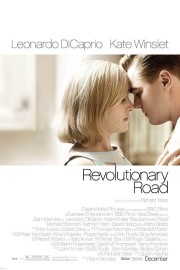Revolutionary Road
Up until I saw the film, the title of Sam Mendes’ latest exploration into suburban alienation- following his 1999 Oscar-winner “American Beauty”- had me curious as to how it related to the film. As the story of April and Frank Wheeler’s entrapment into conventional life in 1950s America unfolds, however, the title not only comes to reference the street they live on but comes to symbolize the middle-class Hell they live in, where the idea of moving to Paris for no reason other than just to get away seems like madness.
For April and Frank, however, Paris is better than the alternative, where the stresses and strains of everyday life have done much to take the luster and life out of living, where the warm facade that they show one another on Frank’s birthday with their kids masks hostilities that surface when they’re alone.
Working from a perspective and patent script by Justin Haythe- adapting a novel by Richard Yates- Mendes and master cinematographer Roger Deakins use the visual archetypes of ’50s Americana- the sterile office buildings, the grey suits, and the sameness of ’50s neighborhoods- to show the trap April and Frank have gotten themselves in. The result is a film that cuts deeper into the out-dated notion of the “American Dream” than the already exemplary work of pulling the curtain back on the ’50s that Todd Haynes did with “Far From Heaven.” And as he has previously with Mendes for “Beauty,” “Road to Perdition,” and “Jarhead,” Thomas Newman’s melancholy piano and evocative sound design does a lot of the deepest cutting, even when April and Frank give into their passions, leading to a third pregnancy that does anything but relax the couple and the final heartbreaking scenes where what goes unsaid could have had a profound impact on the outcome.
As April and Frank, “Titanic” co-stars Kate Winslet and Leonardo DiCaprio do some of the best work of their careers, digging deep into the pain of lost dreams and idealism that have these two at each other’s throats, and sometimes, in other people’s bed (Frank with a secretary at his office, April with a married neighbor). For Winslet, the role is an extension of the role she had in “Little Children,” with April exasperated with the life her and Frank have chosen, wanting to break free from a convention in hopes it’ll make things happier for their family. And DiCaprio hits a new peak, having gotten better and bolder under Scorsese and Spielberg, now hitting a raw nerve as Frank, showing the deadening effect of a 9-5 living on youthful optimism and a marriage. Winslet and DiCaprio go at each other in the argument scenes with unforgettable and powerful force and feeling. But Kate and Leo aren’t the only ones who shine. Kathy Bates- who also starred with the pair in James Cameron’s boat epic- is a marvel as a local realtor who admires the Wheeler’s to their faces but later admonishes them, giving a glimpse of the hypocrisy conformity somehow gives us license to. And Michael Shannon is powerful and unforgettable as John Givings, Bates’ son who is institutionalized, but on a couple of weekend visits outside of the funny farm he has with Frank and April, sees past the facade and cuts deep to the truth he sees on both of their faces, leading to a powerhouse confrontation that is the nail in the coffin for any happiness, and the turning point that leads to the film’s heartbreaking conclusion. Can’t Kate and Leo ever have a happy ending?










